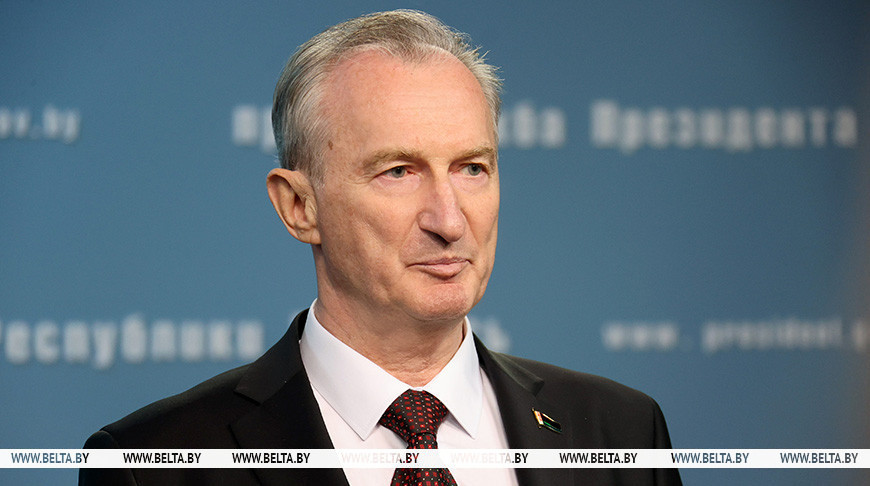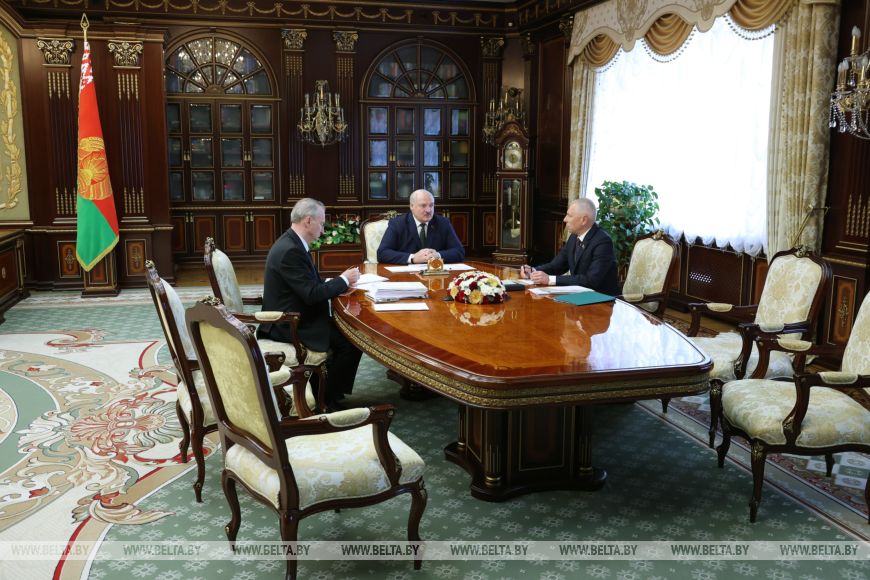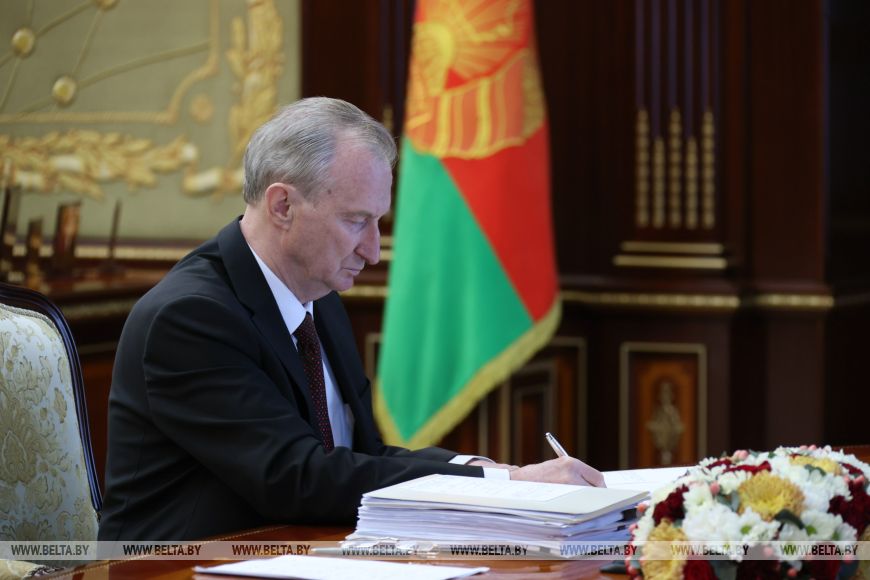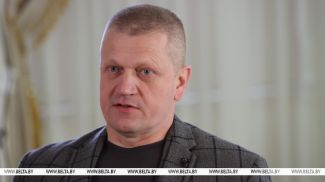
MINSK, 23 May (BelTA) - The Belarusian People's Congress in its new constitutional status is an effective representative body of power, helping solve the tasks of building a state for the people, Deputy Chairman of the Belarusian People's Congress Aleksandr Kosinets told the media after presenting his report to Belarusian President, Chairman of the Belarusian People's Congress Aleksandr Lukashenko on 23 May, BelTA has learned.
The organization and management of the Belarusian People's Congress were the top priority issues that Aleksandr Lukashenko drew attention to as he received the report. The vertical should be organized as follows: Chairperson of the Belarusian People's Congress - deputy chairperson - Presidium - Secretariat - delegates of the Belarusian People's Congress. According to Aleksandr Kosinets, plans are in place to form 10 delegations, including those from the government (led by the prime minister), from the regions, from parliamentarians and deputies of local councils of deputies, and from the judiciary.

According to the deputy chairman of the Belarusian People’s Congress, the main aspects of work will be promptness (action, ability to fulfill the task), control (checking whether the action is correct), efficiency and performance (discipline).
At the same time, the delegates of the Belarusian People’s Congress will work on a permanent basis, not from meeting to meeting, as it was before the new constitutional status was given to the Congress. It will be daily thorough work, outreach activities, interaction with the media, Aleksandr Kosinets stressed. “The Belarusian People’s Congress leadership will hold regular onsite meetings with delegations to check on the organization of the work, consider emerging issues, see what help is needed to solve certain issues,” he said. “This is a completely different platform, different mechanisms, approaches in the organization and management of the Belarusian People’s Congress than in previous years. There is a need for daily constant work, which will be a tangible help for all branches of government. This is an effective, high-ranking, representative body that helps solving all the issues and tasks of building a state for the people.”

Among the issues discussed during the report to the Belarusian leader were the functional duties of the members of the Presidium of the Belarusian People’s Congress, planning of meetings of the Presidium of the Belarusian People’s Congress and the Belarusian People’s Congress itself. The meeting also touched upon the effectiveness of the law on the Belarusian People’s Congress adopted in February 2023. In this regard, Aleksandr Lukashenko set a task for the Belarusian People’s Congress not to replace the executive, legislative or judicial powers, not to interfere with the work of these branches of power, but to suggest better solutions where necessary.
According to Aleksandr Kosinets, a small staff will organize and manage the work of the Belarusian People's Congress: “A total of 14 people will be engaged in the organization and management of the Belarusian People's Congress. There are 11 of them at present. This is a very small number of people who will consider all the issues related to organization, management, preparation, and communication with the regions, with MPs.” The delegations formed in the regions will have their own commissions working on a voluntary basis. They will exchange opinions and make proposals.
The work of the Belarusian People's Congress, all its structures and delegates will be widely covered in the media. According to the deputy chairman of the Belarusian People's Congress, this approach was supported by Aleksandr Lukashenko.
The organization and management of the Belarusian People's Congress were the top priority issues that Aleksandr Lukashenko drew attention to as he received the report. The vertical should be organized as follows: Chairperson of the Belarusian People's Congress - deputy chairperson - Presidium - Secretariat - delegates of the Belarusian People's Congress. According to Aleksandr Kosinets, plans are in place to form 10 delegations, including those from the government (led by the prime minister), from the regions, from parliamentarians and deputies of local councils of deputies, and from the judiciary.

According to the deputy chairman of the Belarusian People’s Congress, the main aspects of work will be promptness (action, ability to fulfill the task), control (checking whether the action is correct), efficiency and performance (discipline).
At the same time, the delegates of the Belarusian People’s Congress will work on a permanent basis, not from meeting to meeting, as it was before the new constitutional status was given to the Congress. It will be daily thorough work, outreach activities, interaction with the media, Aleksandr Kosinets stressed. “The Belarusian People’s Congress leadership will hold regular onsite meetings with delegations to check on the organization of the work, consider emerging issues, see what help is needed to solve certain issues,” he said. “This is a completely different platform, different mechanisms, approaches in the organization and management of the Belarusian People’s Congress than in previous years. There is a need for daily constant work, which will be a tangible help for all branches of government. This is an effective, high-ranking, representative body that helps solving all the issues and tasks of building a state for the people.”

Among the issues discussed during the report to the Belarusian leader were the functional duties of the members of the Presidium of the Belarusian People’s Congress, planning of meetings of the Presidium of the Belarusian People’s Congress and the Belarusian People’s Congress itself. The meeting also touched upon the effectiveness of the law on the Belarusian People’s Congress adopted in February 2023. In this regard, Aleksandr Lukashenko set a task for the Belarusian People’s Congress not to replace the executive, legislative or judicial powers, not to interfere with the work of these branches of power, but to suggest better solutions where necessary.
According to Aleksandr Kosinets, a small staff will organize and manage the work of the Belarusian People's Congress: “A total of 14 people will be engaged in the organization and management of the Belarusian People's Congress. There are 11 of them at present. This is a very small number of people who will consider all the issues related to organization, management, preparation, and communication with the regions, with MPs.” The delegations formed in the regions will have their own commissions working on a voluntary basis. They will exchange opinions and make proposals.
The work of the Belarusian People's Congress, all its structures and delegates will be widely covered in the media. According to the deputy chairman of the Belarusian People's Congress, this approach was supported by Aleksandr Lukashenko.





![Elena Kondratieva-Salguero [Screengrab/BelTA] Elena Kondratieva-Salguero [Screengrab/BelTA]](https://eng.belta.by/images/storage/news/with_archive/2026/000022_1767457641_175467_medium.png)


![Yakov Kedmi [Screengrab/BelTA] Yakov Kedmi [Screengrab/BelTA]](https://eng.belta.by/images/storage/news/with_archive/2026/000022_1767451238_175464_medium.png)




